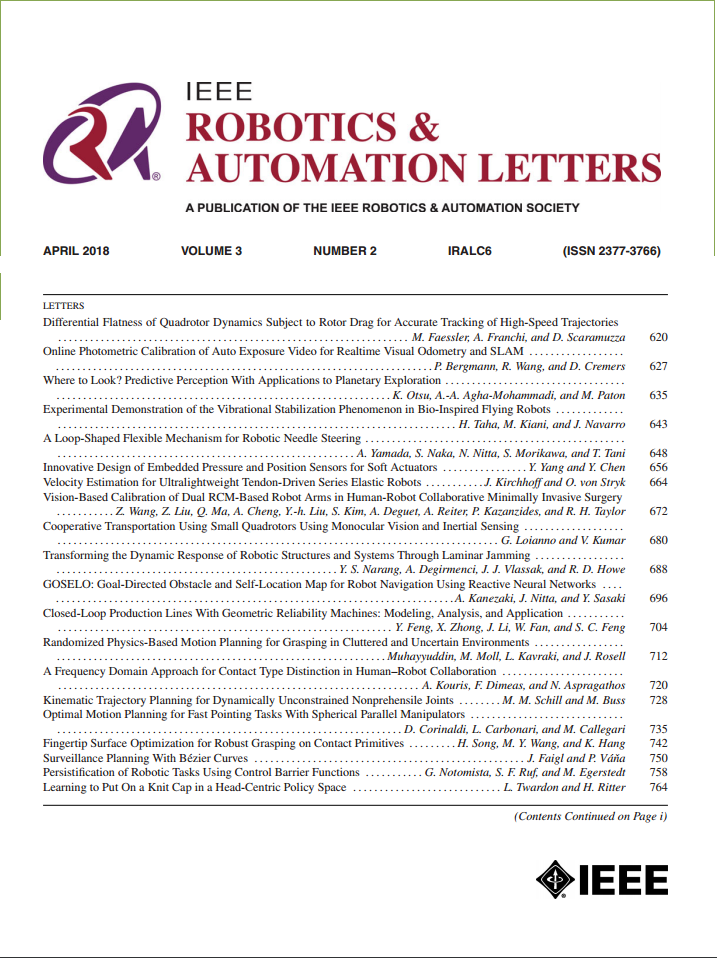Unsupervised Pre-Training for 3D Leaf Instance Segmentation
IF 4.6
2区 计算机科学
Q2 ROBOTICS
引用次数: 0
Abstract
Crops for food, feed, fiber, and fuel are key natural resources for our society. Monitoring plants and measuring their traits is an important task in agriculture often referred to as plant phenotyping. Traditionally, this task is done manually, which is time- and labor-intensive. Robots can automate phenotyping providing reproducible and high-frequency measurements. Today's perception systems use deep learning to interpret these measurements, but require a substantial amount of annotated data to work well. Obtaining such labels is challenging as it often requires background knowledge on the side of the labelers. This letter addresses the problem of reducing the labeling effort required to perform leaf instance segmentation on 3D point clouds, which is a first step toward phenotyping in 3D. Separating all leaves allows us to count them and compute relevant traits as their areas, lengths, and widths. We propose a novel self-supervised task-specific pre-training approach to initialize the backbone of a network for leaf instance segmentation. We also introduce a novel automatic postprocessing that considers the difficulty of correctly segmenting the points close to the stem, where all the leaves petiole overlap. The experiments presented in this letter suggest that our approach boosts the performance over all the investigated scenarios. We also evaluate the embeddings to assess the quality of the fully unsupervised approach and see a higher performance of our domain-specific postprocessing.3D叶实例分割的无监督预训练
粮食、饲料、纤维和燃料作物是我们社会的重要自然资源。监测植物并测量其性状是农业中的一项重要任务,通常被称为植物表型。传统上,这项任务是手动完成的,这是一项耗时且劳动密集的任务。机器人可以自动进行表型分析,提供可重复的高频测量。今天的感知系统使用深度学习来解释这些测量,但需要大量的注释数据才能正常工作。获得这样的标签是具有挑战性的,因为它通常需要贴标者的背景知识。这封信解决了减少在3D点云上执行叶实例分割所需的标记工作量的问题,这是迈向3D表型的第一步。分离所有的叶子可以让我们对它们进行计数,并将相关特征计算为它们的面积、长度和宽度。我们提出了一种新的自监督任务专用预训练方法来初始化网络的主干,用于叶实例分割。我们还介绍了一种新的自动后处理方法,该方法考虑了正确分割靠近茎的点的困难,即所有叶柄重叠的点。这封信中的实验表明,我们的方法在所有调查场景中都提高了性能。我们还评估了嵌入,以评估完全无监督方法的质量,并看到我们的领域特定后处理具有更高的性能。
本文章由计算机程序翻译,如有差异,请以英文原文为准。
求助全文
约1分钟内获得全文
求助全文
来源期刊

IEEE Robotics and Automation Letters
Computer Science-Computer Science Applications
CiteScore
9.60
自引率
15.40%
发文量
1428
期刊介绍:
The scope of this journal is to publish peer-reviewed articles that provide a timely and concise account of innovative research ideas and application results, reporting significant theoretical findings and application case studies in areas of robotics and automation.
 求助内容:
求助内容: 应助结果提醒方式:
应助结果提醒方式:


